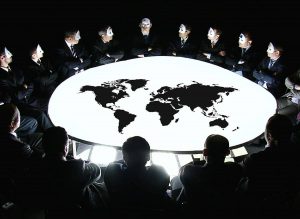The British Conservative Government’s Political Elite, and Post WWII Co-operation with Europe: Crisis of Confidence in British Politics, and the 2016 Referendum on Disrupting the Status quo!
When Churchill advocated that Europe should become united, although then out of office, he worked hard to involve the United States in the defence of Europe, a policy that Ernest Bevin was equally keen on. Britain welcomed the Marshall Plan, accepting Washington’s lead in West Germany and Berlin, the signing of the N.A.T.O. treaty and the assumption by the United States of a dominating military position in the whole area. Consequently, American power and money prevented the left from victory, particularly in Greece and Italy where the ruling class was approaching total political bankruptcy, and the capitalist system in Western Europe remained stabilised. Churchill said, in regard to Britain’s post-war role:
“As I look upon the future of our country in the changing scene of human destiny, I feel the existence of three great circles among the free nations and democracies … first circle for us is naturally the British Commonwealth and Empire, with all that that comprises. Then there is also the English-speaking world in which we, Canada, and the other Dominions and the United States play so important a part. And finally there is the United Europe ….Now, if you think of the three inter-linked circles you will see that we are the only country which has a great part in every one of them.”3
Although having to accept America in the leading role, Brita in, from the beginning, had influenced N.A.T.O., which also covered the regional Pacts, to accommodate British interests and the British sphere of influence, as well as American requirements. (S.E.A.T.O. and C.E.N.T.O., the regional Pacts that we discussed, were all with American participation.)
In respect of the E.E.C., Britain’s formal application for membership was made by MacMillan in August 1961. By December 1962 the negotiations for British membership of the E.E.C. were making progress. However, in mid-December, at a meeting in Rambouillet, just before the Nassau Conference of MacMillan and Kennedy, the French President, de Gaulle, had made his position clear by telling MacMillan that he did not consider Britain to be European, and that he would veto British application to join the Community. MacMillan was afraid that the opposition in Washington to Britain obtaining Polaris and to the special nuclear relationship with Britain would be strengthened by such a set-back and force Kennedy to retreat from selling Polaris, and from the nuclear relationship in general; so he did not reveal the news in Nassau.
Nevertheless, against the background of the continuing post-war economic problems, and the frosty relationship between Britain and the U.S. after the Suez Canal crisis, MacMillan managed to re-establish the friendly relationship that had existed between Churchill and Truman and bring about the ‘special relationship’ that Churchill always wanted Britain to have with the United States. Consequently, MacMillan even managed to maintain an independent nuclear deterrent for Britain, which thus remained a member of the ‘nuclear club’. As has been pointed out, MacMillan’s policy is still operating today between the U.K. and the U.S.. Thus MacMillan secured Britain’s defence and managed to bring the old Empire to a New Commonwealth, and prevented the ex-colonies from falling into the Communist sphere of influence. As we have said, MacMillan, like Churchill and Eden, believed that Britain was not exclusively European, and that she should maintain her, special link with the Commonwealth, the sterling area and the United States. Additionally, alliance with the United States was fundamental to Britain and her interests and security. However, the difference between MacMillan, Churchill and Eden was that MacMillan did not have Churchillian nostalgia, nor Eden’s overestimation of Britain – especially in the face of her weakened economy and the U.S.S.R./U.S.A.’s superpower status.



